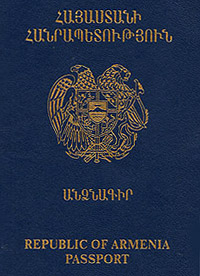Sometimes people ask me why I don’t write about this or that article in the proposed constitutional amendments. I tell them that I usually don’t write anything about the constitution. The people that ask me the question recall my previous articles. I claim that I have not written one line about the constitution. They continue to be stubborn and claim that I can’t be based on my principles and, for example, not write about dual citizenship, which is the most significant issue in our country. I simply ignore their comments; stay true to my principles and to the readers by writing some words about citizenship.
You might have noticed that the word “citizen” is not part of our general vocabulary. For example, when someone wants to get off at a bus stop, he does not say to the person standing in front of him-citizen, please move so I can get out-like, for example, the Russians when they say “grazhdanin, darogu (citizen, stand aside). We Armenians say “bro” or “uncle” depending on the sex and age of the person standing in front of us. If the person is a little older, then we say “yo uncle”, “sister” and “aunt” to the women. They don’t say that in order to show that they can treat the person fairly, but because they doubt that the person standing in front of them is not from some village and has just come to the city.
“Dear people” and “I love my people”…These are the word-expressions heard during the meetings organized by our opposition leaders where the number of people present reaches the four digits on some occasions. It can’t be five digits because the people are not counted by five digits due to the fact that people is a general concept no matter how much you try to break it down to patriotic, political, youth and other units.
Whenever I happen to pass by those meetings (I usually happen to pass by) and hear “My dear people” and “Much love for my people” expressions, I suddenly turn around because after all, I am also a part of the people. But as I look at the faces of the individuals that are ready to govern the nation, I quickly turn away and suddenly remember that I, the individual, am not people, but rather a citizen.
By the way, I must say that the number of the participants of the meeting are not five or six digits, due to the fact that the people (people meaning Armenians living in Armenia and the Armenian Diaspora) are not the ones taking part in the political demonstrations, but rather the citizens. The ones calling out “people” do not refer to the active citizens joining others in the meetings, but rather the naive but at the same time kind and virtuous villagers raising cattle in the farm or the electorate living in Los Angeles which is deprived of rights (I mean electoral right) but has heard that we have to show affection towards Robert Kocharyan, however, has difficulty in stating why. In this sense, the opposition leaders must be interested in the dual citizenship clause, however, I am not going to change the subject. Thus, I will not continue to talk about this constitutional norm, but rather-the proposed abnormality.
“Dear radio listeners”…The DJ, who is the only one that has the right to say this word-expression, does not try to be sentimental and all; on the contrary, he just uses the adjective “dear”. The DJ could salute the listeners with the words “honorable”, “respectable”, etc. but then the logical meaning of that would not be out in the open. If the citizen can be broken down to a radio listener, then he or she can only be dear because only the ear of a dear person can be filled with all the lies and false comments that promise an outlook for prosperity and happiness.
The citizen is alienated and exiled from everywhere and that has nothing to do with having a good or bad constitution. The police officer, who talks to the doctor of sciences or, for example, the journalist by calling him “hey there my friend the driver”, says “no” to the old, useless and newly proposed constitutional amendments corresponding to European norms. We can understand the word “friend” used in the conversation; that comes from old times when Lenin and his followers were greeting each other by “friend” when structuring communism. But the driver….This is even lower than the radio listener. Let’s say someone has just finished his lecture on nuclear physics at the university and is heading for the school to pick up his child but forgets to turn the signal on when making a right and loses control. If the police officer called drivers citizens, it would not be necessary to see a difference between a physician and a driver.
When I was working for the wool textile factory’s newspaper edition during the end of the Soviet era, I read someone’s announcement on the board and got really excited: “Dear women with feelings, we wish you a happy March 8th. Administration.” Well, it was the end of the Soviet Union, everything was fun and to say something absurd was no longer tragic. But when I read the announcements posted on the building entrances of independent and democratic Armenia that reads “Dear residents”, I start to think that, for any ordinary resident, the dual citizenship clause is a big step towards societies that have stable citizenship

